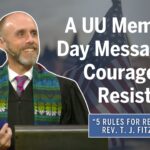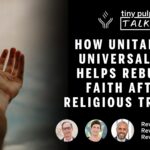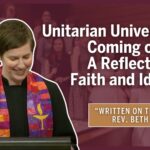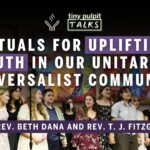Liberty in Action | Rev. T. J. FitzGerald | 10.15.23
In the second sermon in our Rituals That Ground Us series, Rev. T. J. FitzGerald talks about the freedom that many find in Unitarian Universalism and how we all have a responsibility to be sure these sacred places live on.
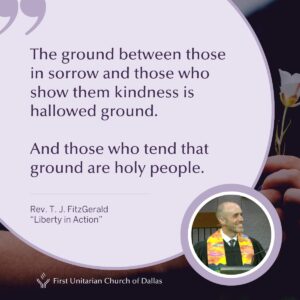
Sermon Transcript
Well, I’m going to give you a choice, friends. I can speak to you for roughly the next 20 minutes, or you can find a pledge card. You can fill it out, increase that pledge, and drop it in a box. And if you do that, instead of listening to the sermon, we’ll play my favorite game, full choir karaoke. It’s that game where I call the choir back in, and you get to choose a song that requires a full choir to back you up, like “Sit Down, You’re Rockin’ the Boat” from Guys and Dolls, or “Like a Prayer” by Madonna, and our sanctuary choir will back you up while you sing your solo. It’s your choice, friends, pledge or Madonna. Yeah, I know. It’s wishful thinking. Unfortunately, the rest of these pages are just Madonna sheet music. So we’re in our series on rituals that ground us right now. It’s part of a number of series that we’ll work through this year around our theme of Waves of Purpose, Tides of Change.
Giving is one of those most common and essential rituals many of us ever practice. Before I go any further, though, let me say to you, you are enough. I love you, and nothing will ever change that. I say that to you because I have a practiced before. I have a conversation that might strike a sensitive cord with someone to assure them. You’re enough, and I love you no matter what, all right? Okay. Now give me your money.
The First Sermon on the Amount
I remember my first Sermon on the Amount. It’s the insider, not-so-insider any more name for a sermon about giving during pledge times. I was sitting in a Lutheran church in Manhattan, story for another time. And I had only been attending their Sunday Jazz Vesper service, which was more like a jazz concert than a service. But I was starting to dip my toe into the waters of this Sunday morning service, and one of the ministers just got up there to talk about given and told me, “You are not good enough.” Well, that’s what I heard. That’s what I felt. All she did was simple division. It takes X dollars per person per year to run this place. But when she said it, the shame came, friends. I wasn’t given anywhere near the amount she said to the church. So I did what any healthy, mature, thoughtful person would do when they are uncomfortable. I ran.
I loved this church, and it sounded like I was costing them money for taking up my little square in the corner. If I couldn’t pay the basic amount that it cost the church, I’d figure I’ll save them the money. And it had the added benefit of I’ll show them. Oh, I’ll show them by depriving myself of my own spiritual needs. So silently, noiselessly, with no explanation or fanfare, I vanished without a word. And I thought, “They’re really going to get it now. They’ll be sorry.” Well, after a few months of hearing nothing from anyone, I realized I needed my church more perhaps than they needed me, and I went back. The storm had passed for me, but that number stuck in my head. I wanted to understand what that money was being spent on and where it was coming from.
So I learned more about the church by asking some questions. I learned that the soloists that were in the choir I loved so much were paid an honorable and generous wage to prepare music for us. I learned that the ministers were able to purchase homes in the New York City area where they ministered to us. No small feat. I learned that the maintenance costs of an elevator in Manhattan that is strong enough to carry caskets is a lot. And I learned all the jokes that came with an elevator strong enough to carry caskets. The jokes about raising the dead, those Lutherans. We might’ve hummed “He will Raise You Up” once or twice on that elevator. And the more I learned, the more I saw that the church had priorities first, like worship, learning, professional ministry, and care of its people from birth to death. Then they figured out how to support those priorities. And in their own way, to say to me, “You are enough. We love you. And nothing is ever going to change that.”
A word of caution to you all after asking all these questions and showing such genuine, earnest interest. Anyone want to guess where they found a spot for me? On the board. Be warned.
Discovering Unitarian Universalist Faith
But this was all before I discovered the Unitarian Universalist faith. I like to say that the Unitarian Universalist faith is the first, the last, and the only house on the block for a lot of us. It’s the first house on the block for those who are so blessed to grow up in this embracing faith. People like my colleagues, Beth and Daniel. For those you use, they don’t have to venture far and wide to find this home. They simply found their seat in it. It’s the last house on the block for those who had to search for this embracing faith. People like me, it’s the last house on the block for those who searched out of place of affirming and openness. Almost had to search until I found this community, like it was hidden, somehow undetectable right there under an enormous steeple, two-hole blocks from my house.
To be fair, they were avenue blocks. And in Manhattan, that’s like a different state. And for many of us, first house and last house alike. It’s the only house on the block for us. The phases of our youth and our origin, and this is not all of us, but it’s some of you I know. Those phases of our youth and origin taught us that we were broken or wrong, that our very being was a cause for shame or mortal fear. And this house said that’s about enough of that because of the ways we have been treated in those other houses and because of how deeply and sacredly our worth and dignity are held here. This is the only house on the block.
And I just want to say to those who are made ever to feel that way, I’m so deeply sorry. Anyone in our profession did that. Your presence here is like a prayer of hope. That’s why I say a Unitarian Universalist Church is the first, the last, and the only house on the block for so many.
The Statue of Liberty and Its Message
The poet tells us today, “Give me your tired, your poor, your huddled masses yearning to breathe free, the wretched refuse of your teeming shore. Send these, the homeless tempest-tossed to me. I lift my lamp beside the golden door.” Exclamation point.
It’s always hard for me to get through that poem. It really is. I get emotional. Why do you think that is? Maybe a simple part of me wants to be in a nation that speaks these words and lives them out. Maybe. Maybe I yearn to say, “We welcome you, and we love you because of awful, hard journeys your life has known. I want to say here. Here is your dream of freedom, washed with the golden reflection cast from this light. Take it, take it, and yearn for freedom. No more. Breathe free.” Maybe. Maybe I get emotional from that poem because an older, more realistic part of me knows that life in this world just ain’t that simple. Maybe that older self is mourning the loss of that innocent hope. Maybe.
But I think I get emotional when I read that poem because I’ve been tossed by tempest. Churning seas of longing and loss have tilted me because I’ve been tired, because I’ve been poor, because I have yearned to breathe free. And all that time, I never knew the lamp at the golden door was for me. A glowing chalice held the loft not in a harbor by a statue of cold copper, but by a faith, by a people, by every single one of you. These words by Emma Lazarus are etched into the Statue of Liberty, etched into the site that has beckoned and greeted millions to these shores. Has anyone been there in the harbor and approached it? Yeah. A lot of people more than went to the Underground Railroad Museum. Note that. It’s kind of wild, right? Not a lot of harbor sculpture going up these days. It’s a different time.
She’s out there alone. The greeter of many, the companion of none. Lifting, always lifting the lamp beside the glittering door like a prayer or an answer to a prayer. Maybe a prayer prayed by my great-grandmother in that very harbor, who was welcomed by the new Colossus before I was even a glimmer of a thought in smiling Irish eyes.
Responding to Hatred and Sorrow
In this last week, watching and learning and aching and crying. I’ve asked why so many times. I’ve asked how so often. I’ve asked, “Are you there? Are you seeing this? Friends and loved ones in tears in fear.”
One friend told me, her youngest child asked her about possibly changing their last name to be less identifiable. For so many so long, it’s been a waking nightmare. You’ve heard the church response, hatred in vengeance begets more hatred, more vengeance. But the question comes, “What’s my response? What do people of faith do?” In these times, I’ve often drawn to the words of the Dalai Lama, who says his religion is not Buddhism. His religion is kindness.
Naomi Shihab Nye tells us, “Before you know kindness as the deepest thing inside, you must know sorrow as the other deepest thing. You must wake up with sorrow. You must speak to it till your voice catches the thread of all sorrows and you see the size of the cloth. Then it is only kindness that makes sense anymore, only kindness that ties your shoes and sends you out into the day to gaze at bread. Only kindness that raises its head from the crowd of the world to say, ‘It is I you have been looking for.’ And then goes with you everywhere like a shadow or a friend.” It’s hard for me to get through that poem too, but I know why. There’s no maybe there.
It’s because I know it’s truth in my bones. Its gold and light is what lit my way to this place.
Liberating Souls and Voices
The ground between those in sorrow and those who show them kindness is hallowed ground, and those who tend that ground are holy people because people of faith know the truth that all that was ever sacred was born of kindness, answering sorrow. It is what the world asks of us all, and it is the gift that great faiths offer this world. Giving liberates the soul of the giver. Maya Angelou tells us all, “So what do people of faith do? What do I do? What do we do?” We listen to Ms. Angelou as we all should and put that liberty in action. Liberate your soul by giving kindness where there is sorrow. Yes, liberate your voice by giving voice after this worship service to those values that you want to see expressed in this world. I say that to you. What do people of faith do? You could also listen to me put that liberty in action and liberate your checking account by the amount of your pledge. Just saying.
We can’t all be Maya Angelou, but we can all join the chorus of voices that cry out for freedom. We can accompany one another sorrows with the gifts of kindness and not judgment. And in this way, we can assure that institutions who make it their mission to speak the truth no matter what the cost will not perish from this earth ’cause they are getting rarer and rarer, friends. More rare and more rare are the halls that echo with the unchained heart, with the untethered soul, where liberty leads and does not follow. More rare and more rare are the grounds where kindness meets are sorrow and sacred trust is born. More rare and more rare are the days are the ways we each have left to be sure these sacred places shall live on and on.
This house, this idea, this liberty, these people, may they live long like a message to those tossed and blown, like a promise to those who can just glimpse the gleaming door like a prayer to you, to me, and all those yearning to breathe free. Kindness says, “It is I you have been looking for. Go with me everywhere like a shadow or a friend. May it ever be so blessed be and Amen.




